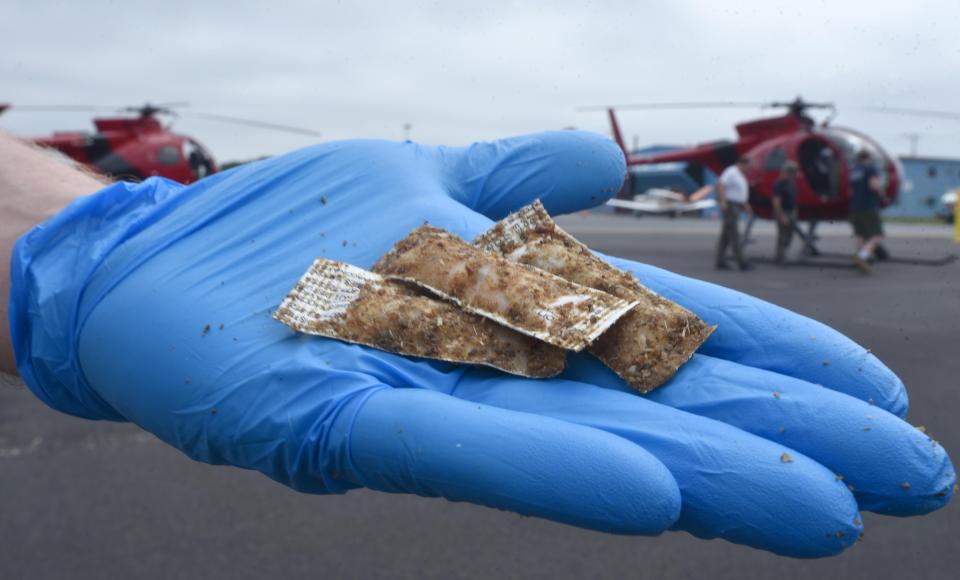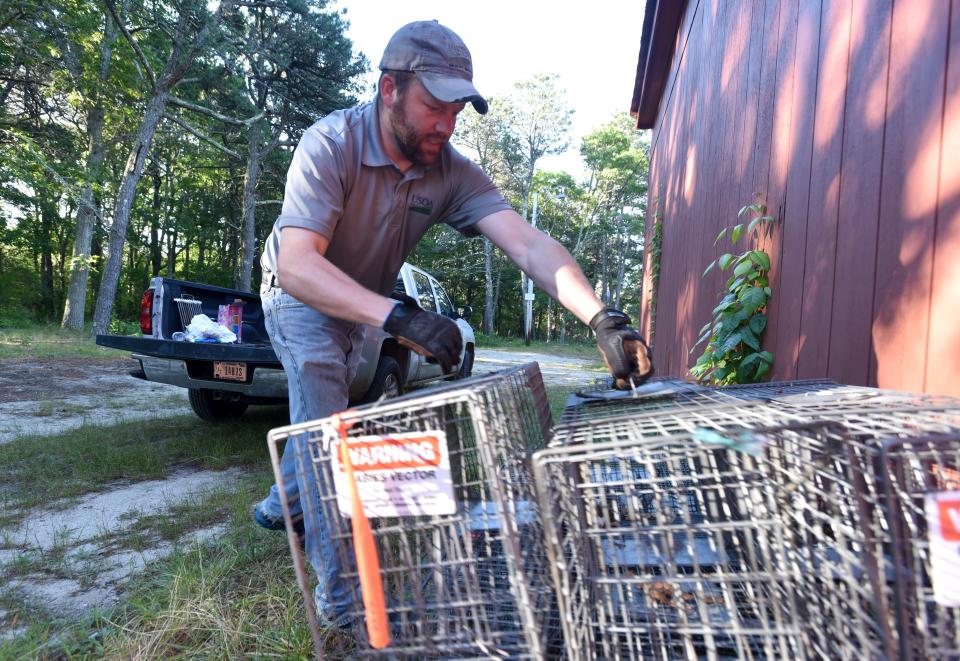Rabies vaccine drop underway Mid-Cape, near Cape Cod Canal: Expect low-flying helicopters
Raindrops aren't the only things falling from the sky over parts of Cape Cod this week. The Cape Cod & Southeast Massachusetts Rabies Task Force is preparing to begin aerial distribution of oral rabies vaccine baits for wildlife from the Mid- to Upper Cape, as well as several communities on the mainland side of the Cape Cod Canal.
The aerial effort was scheduled to start Tuesday, though the weather was causing delays in the morning. Distribution is expected to continue through Sept. 15 but could be extended if Mother Nature proves uncooperative.
"We're really at the mercy of the weather," said Wildlife Biologist Brian Bjorklund, with the U. S. Department of Agriculture Wildlife Services and coordinator of the Cape Cod rabies program.
The effort will also include ground distribution of baits by hand with help from town, county and federal employees, and volunteers.

During the operation, residents may notice a low-flying, red and black helicopter.
Where are oral rabies vaccines getting distributed?
On Cape, baiting will take place in Bourne, Falmouth, Sandwich and Barnstable. West of the canal, baiting is occurring in Plymouth, Wareham, Kingston, Carver, Middleboro, Lakeville, Middleboro Rochester, and Marion.
"It's basically the northern section, north of Route 6 to about Sandy Neck, then just over the Falmouth line and part of Joint Base Cape Cod," said Bjorklund.
About 75,000 baits will be distributed.
"There's two different types. The baits coming out of the helicopter will look like a small ketchup packet covered in crumbly fish flakes," he said. They smell bad, but they attract the wildlife population the task force is aiming to vaccinate, such as raccoons, foxes, skunks and coyotes — when the animals bite into the packet, they will get a dose of rabies vaccine.
The other baits are vaccine-laden fishmeal polymer blocks that are distributed by hand, or by way of bait stations set up at various locations that are prime habitats for the target wildlife.
What if a bait is found? Can it harm pets and people?
The baits are meant to be distributed in areas frequented by wildlife that may spread rabies, such as raccoons, "and away from areas where domestic animals and people are likely to find them," according to the task force.
While the baits are typically not harmful to people and pets, and there is no risk of getting rabies from contact with them, Bjorklund said it is advised not to handle them as there have been cases where immunocompromised people have developed a rash after handling baits with bare hands.
People who come in contact with baits should wash their hands thoroughly with warm water and soap. The same is advised if someone has contact with the liquid vaccine inside the baits, and they should contact the state Department of Public Health at 617-983-6800.
People are asked not to disturb the baits if they encounter any, but if they must be moved, use a glove or trowel and throw baits into the woods so that they can get to the animals it is meant for. If there is no suitable place to do this, then they should be disposed of in the trash.
"It is important to note that the baits are not toxic to pets but may cause an upset stomach if ingested due to the richness of the bait attractant," according to the task force.
If a pet eats a bait or has contact with one, report it to the Barnstable County Department of Health and Environment at 508-375-6620.
If a bait is found, residents are asked to call 877-722-6725 to report where it was located.

Why is the oral rabies vaccine getting distributed to local wildlife?
The Cape Cod Rabies Task Force, said Bjorklund, "was started in 1994 in response to raccoon variant rabies" on the mainland. Organizations banded together "to prevent rabies from getting to the Cape."
"That worked up until 2004, when rabies hopped the canal and spread to Provincetown by 2006," he said. "It took us a very long time to get it back off the Cape" through the distribution of oral vaccines.
But then, in May 2021, the first raccoon-variant rabies case on Cape Cod in more than eight years was documented in Hyannis. At that time, the USDA implemented an emergency trap-vaccinate-release campaign throughout the Mid-Cape to prevent the disease from spreading. According to the task force, more than 700 raccoons were captured alive and unharmed, vaccinated against rabies, tagged, and released at the site of capture.
"Genetic sequencing for that one rabid raccoon we had in Hyannis in 2021 revealed that it was a relocated animal" from elsewhere in Massachusetts, Bjorklund said.
He stressed that wild animals should never be captured, and certainly never relocated.
"One of the big reasons is you could relocate disease to an area that doesn't have it," he said.
The continuing bait distribution on Cape is to decrease the potential for the disease to spread. Distribution on Cape Cod occurred in July and September of 2021 from the canal to Orleans, and continued in May of 2022 from Lakeville to Harwich and Brewster.
In 2012: Rabies killed Marstons Mills man
The distribution zone was reduced last September to the areas that were treated prior to the 2021 Hyannis case, the current area where baits are getting dropped.
This month, Bjorklund said, "We are baiting a little bit on the Cape itself, but not to the extent we had been." That's because "we haven't detected another case (since 2021), and we felt it was safe for us to move back to where we had been baiting prior."
"Now we're trying to prevent it from coming back to the Cape, so that's why we're baiting," he said.
The program, he said, "has been one of the most successful rabies management programs in the country," which he attributes largely to the collaborative efforts of the task force, the state and the USDA.
"It's been really the gold standard for rabies task forces," not just in the country, but internationally, he said.
What is rabies?
The Barnstable County Department of Health and Environment describes rabies as "a very serious disease that affects the brain and spinal cord of mammals such as cats, dogs, raccoons, coyotes and foxes."
"It is caused by a virus and almost always causes death. Rabies is usually a disease of animals, but it can spread from an infected animal to a person," the department's website states.
Rabies spreads when an animal with rabies bites another animal or person.
"The virus is in the saliva of infected animals. Infected animals can also spread rabies if their saliva gets into a scratch or other wound, or the eyes, nose or mouth of another person or animal," according to the department.
Human deaths from rabies are rare.
A Cape man suffering from rabies died in 2012. A death certificate filed at Boston City Hall, and obtained in 2012 by the Times, identified him as Kevin A. Galvin of Marstons Mills. Galvin, 63, died Jan. 23 of that year, according to an obituary that did not name the cause of death
"In New England, we have two rabies variants: A raccoon variant and bat variant, but that doesn't mean that it can't spill over into other species," Bjorklund said. "By controlling rabies in raccoons, the primary reservoir here, we're effectively managing it in other species as well."
At present, he said, there is "really no effective means of mass vaccination of bats," though researchers are studying the possibilities.
Bjorklund advises anyone who wakes up to a bat in their bedroom that they should have the bat tested for rabies and be sure to contact their public health department.
Visit the Cape Cod & Southeast Massachusetts Rabies Task Force’s Facebook page for the latest information and daily updates during the oral rabies vaccination bait distribution event: https://www.facebook.com/CapeCodRabiesTaskForce/
Heather McCarron writes about climate change, environment, energy, science and the natural world. Reach her at hmccarron@capecodonline.com, or follow her on Twitter @HMcCarron_CCT
The Cape Cod Times is providing this coverage for free as a public service. Please take a moment to support local journalism by subscribing.
This article originally appeared on Cape Cod Times: Rabies vaccine packets dropped for Cape Cod wildlife. What to know.

